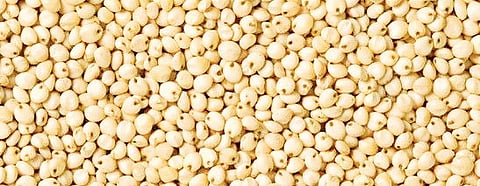Jowar prices plummet, farmers suffer loss amid drought in Karnataka's Gadag
GADAG: Farmers of Gadag are worried as prices of jowar have seen a sudden decline since the past ten days. Following the downward trend of red chilli prices, farmers are forced to face consecutive losses amid the drought situation. While the price of jowar was about Rs 7,000-8,000 per quintal in the last month, the present price has dropped to Rs 2,500-3,500. The prices have a taken a blow as farmers continue bringing more jowar to market when the crop quality has been poor due to scanty rain this year.
One of the major crops in both North and Kalyan Karnataka, Jowar is grown in Koppal, Haveri, Gadag, Bidar, Dharwad and other districts. Many farmers had taken to jowar cultivation hoping it would fetch them a good price. However, those who sowed white jowar seeds and chilli crops in North Karnataka have now been plunged into financial crisis. While some farmers went to sell their produce at the Bengaluru market for Rs 4,000 per quintal, transportation costs have offset any of their potential gain. Meanwhile, some farmers have stored their jowar in a warehouse in hopes of better prices in the future.
Prakash Neeralagi, a farmer from Gadag said, “When we went to the market to sell jowar bags, we were offered Rs 2,200 per quintal. The price range is similar in Ballari, Bengaluru and Koppal markets. Economically sound farmers have stored their jowar. But, small farmers are forced to sell suffering devastating losses. Drought has affected many farmers in Karnataka. Gadag farmers suffered losses in both Kharif and Rabi crops.”
An official from Agriculture department of Gadag said, “Farmers can visit their nearest agriculture department to get the best quality crops which can secure better prices in the market. Drought situations are inevitable, but we will help the farmers if they visit us before sowing seeds.”

